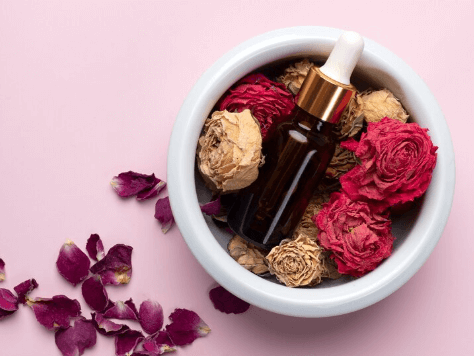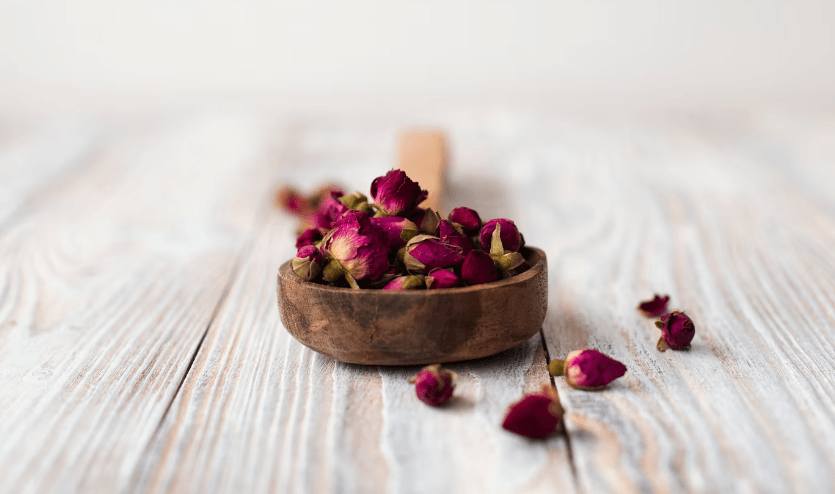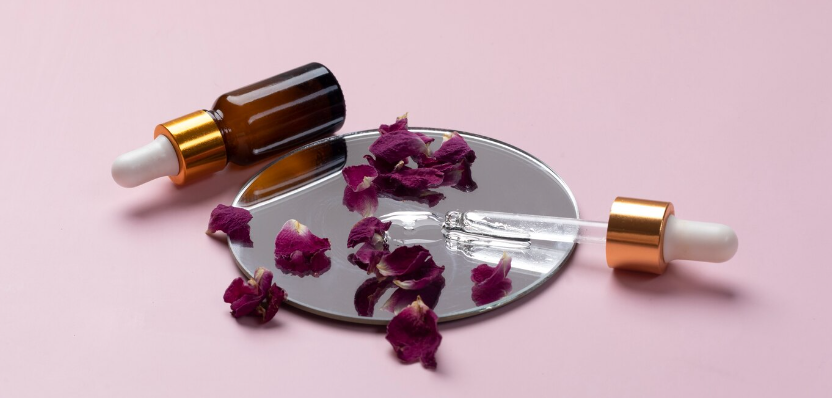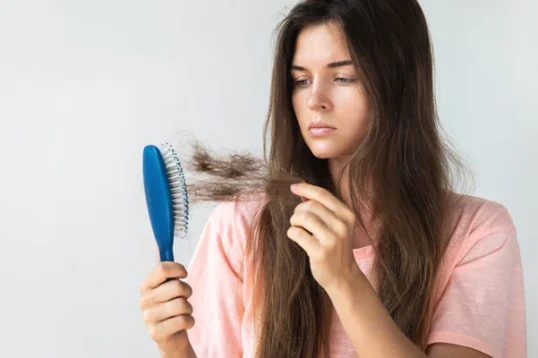Would you like to have long, glossy, and healthy hair? Are you a victim of hair loss or dry or damaged hair? If your answers to these questions are positive, then you should use rose oil in your hair.
Let’s explore the allure of rose oil, a natural and luxurious solution for your hair growth goals. We’ll investigate its safety, the science behind its regenerative properties, and the proper application methods. Discover the secrets of this exquisite oil and unlock its potential for your hair’s health and beauty!
Rose oil for hair growth is a natural product that helps the hair to grow faster and healthier.
Rose oil benefits hair by moisturising and strengthening hair, reducing inflammation, and inhibiting bacterial growth. If you want your hair to grow longer, use Hair Lotion for Hair Growth.
For maximum results, it is advisable to use rose oil for hair growth and follow specific rules daily.
Rose oil for hair growth is a product derived from rose petals. Its sweet and floral fragrance can easily make one feel relieved and joyful. Rose oil positively affects emotions and can enhance hair growth and quality.
This will describe how to use rose oil for hair growth, why it fits hair, and how to apply it. You will learn how to apply rose oil to achieve the hair of your desire.
Why is Rose Oil Good for Your Hair?

Rose oil for hair growth has many benefits for your hair. Here are some of them:
Rose oil for hair growth might be a useful supplement when used with a healthy lifestyle and hair care routine to promote hair development.
How to Use Rose Oil for Hair Growth?

There are different ways to use rose oil for hair growth. You can choose the one that suits your preference and lifestyle. Here are some of the most common methods:
Massage rose oil into your scalp and hair using your fingertips or a brush. This can stimulate blood circulation and nourish your hair follicles. You can do this before washing your hair or leave it overnight for better absorption.
Add a few drops of rose oil and wash as usual. This can cleanse your hair and scalp, removing dirt and oil. It can also make your hair smell nice and fresh.
You can mix rose oil with your conditioner or use it as a leave-in conditioner. This can moisturize your hair, make it softer and more manageable, and prevent tangles and frizz.
Dilute rose oil with water and spray it on your hair and scalp. This can refresh your hair and scalp, adding shine and volume. It can also help protect your hair from heat and environmental harm.
Apply rose oil as a leave-in treatment before bed and wear a shower cap to prevent staining pillows. Wash your hair thoroughly in the morning.
Tips to Get the Best Results from Rose Oil for Hair Growth

You should follow some tips to get the best results from using rose oil for hair growth. Here are some of them:
Combine rose oil for hair growth with other hair-nourishing ingredients like honey, yoghurt, or avocado for a deep-conditioning hair mask. Leave it on for 30 minutes to an hour before rinsing thoroughly.
Here are some potential side effects of using rose oil for hair growth:
Rose oil is generally safe for use on the skin and hair, but like any essential oil, it can cause side effects in some individuals, mainly if used in high concentrations or if you have sensitive skin.
It’s always best to dilute rose oil for hair growth with a carrier oil, such as coconut or jojoba oil, before applying it to your scalp or hair. If you have sensitive skin or are prone to allergic reactions, performing a patch test before using rose oil extensively is advisable. If you experience any adverse reactions, stop using the oil and consult a healthcare professional.
Conclusion
Rose oil is a natural product that can help your hair grow faster and healthier. It has many benefits for hair, such as moisturizing, strengthening, reducing inflammation, and preventing infections. You can use rose oil in different ways, such as massaging, shampooing, conditioning, or spraying. You should regularly use rose oil for hair growth and follow some tips for the best results.
Try rose oil for hair growth if you want long, shiny, and beautiful hair. It can make your hair smell like roses and make you feel like a princess.
She frequently Asked Questions about Rose oil.
-
What are some other benefits of rose oil for hair growth?
Rose oil for hair growth has many other benefits besides the ones mentioned. Some of them are:
1. Improves skin health: Rose oil can help with acne, eczema, rosacea, scars, and wrinkles.
2. Boosts immunity: Rose oil can enhance the body’s natural defences against infections and diseases.
3. Promotes sleep: Rose oil can induce relaxation and calmness, which can help with insomnia and other sleep disorders.
4. Heals wounds: Rose oil can speed up healing cuts, burns, and bruises. It can also prevent infections and reduce inflammation and pain.
5. Balances hormones: Rose oil can regulate the levels of hormones in the body, such as estrogen and testosterone. It can also help with menstrual cramps, mood swings, and menopausal symptoms.
These are some of the fantastic benefits of rose oil. You can use it differently, such as aromatherapy, massage, or topical application. However, before applying it to your skin, you should always dilute it with a carrier oil, such as coconut or almond oil. You should also conduct a patch test to detect any allergic responses. Before using rose oil, speak with your doctor if you are pregnant, breastfeeding, or have a medical problem. -
What is the history of rose oil for hair growth?
Rose oil, derived from the petals of many roses, is essential for hair growth. It has a sweet and floral scent and is widely used in perfumery and aromatherapy. Rose oil is still considered one of the world’s most precious and luxurious essential oils.
-
Can I use rose water instead of rose oil?
Rose water and rose oil are different products with different benefits and uses. Rose water is gentler and less concentrated than rose oil, so it is suitable for sensitive skin. Therefore, you can use rose water or rose oil, depending on your needs and preferences. However, you should always dilute rose oil with carrier oil before applying it to your skin, as it might cause irritation or allergic reactions. You should also perform a patch test to ensure there is no sensitivity. Before utilizing rose oil, you should speak with your doctor about whether you are expecting, nursing, or suffering from a medical ailment.
-
How do I store my rose oil or water?
Rose oil and rose water are natural products that can help your hair and skin but have a limited shelf life. To make them last longer, you should store them properly. Here are some tips on how to store rose oil or water:
1. Store your rose oil or water in clean, airtight glass bottles or jars. Avoid plastic containers since they might leech chemicals or change the aroma of your products.
2. Store your rose oil or water in a cool, dark place, away from direct sunlight and heat. Sunlight and heat can reduce the quality and potency of your items. You can store them in the refrigerator, but ensure they are well-sealed to prevent contamination or odour transfer.
3. Label your rose oil or water with the date of purchase or production and the expiration date. This will help you keep track of how long you can use them. Store-bought rose oil generally lasts up to two years, while homemade rose oil lasts up to six months.
4. Check your rose oil or water regularly for signs of spoilage, such as changes in colour, smell, or texture. Discard it if it has turned green or brown, has a strange or sour smell, or has become cloudy or slimy. Do not use expired or spoiled rose oil or water, as they can cause irritation or infection. -
Can I mix rose oil with other essential oils?
Mix rose oil with other essential oils to create aromatherapy, perfumery, or skincare blends. Rose oil is versatile and harmonious and can complement many scents and effects. However, you should always follow some guidelines when mixing rose oil with other essential oils, such as:
1. Use pure and organic rose oil and other essential oils free of additives, chemicals, or synthetic fragrances. These can harm your skin or health or alter the aroma of your blend.
2. Use the right amount of rose and other essential oils for your purpose and preference. A 1% to 5% dilution is recommended for topical usage, which equals 1 to 5 drops of essential oil per teaspoon of carrier oil, such as jojoba oil, almond oil, or coconut oil. You can use more drops to diffuse depending on the size of your diffuser and the strength of the perfume you want.
3. Use rose and other essential oils with similar or complementary effects, scents, or notes.
4. Experiment with different combinations and ratios of rose and other essential oils until you find the ones that suit your needs and preferences. You can start with a simple blend of two or three oils and then add more or adjust the amounts as you like. You can also use online tools or books to find recipes or suggestions for rose oil blends. -
How should I use a natural hair growth serum?
Follow the teachings the manufacturer provides for the specific product you’re using. Typically, you’ll apply the serum directly to the scalp or affected areas of the hair, massaging it gently to promote absorption. Use the serum consistently as part of your everyday hair care routine for the best results.

